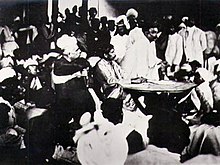This article needs additional citations for verification. (February 2020) |

Sri Aurobindo's political career lasted only four years, from 1906 to 1910. Though he had been active behind the scene surveying, organizing and supporting the nationalist cause, ever since his return to India, especially during his excursions to Bengal. This period of his activity from 1906-1910 saw a complete transformation of India's political scene. Before Sri Aurobindo began publishing his views, the Congress was an annual debating society whose rare victories had been instances of the empire taking a favourable view to its petitions. By the time Aurobindo left the field, the ideal of political independence had been firmly ingrained into the minds of people, and nineteen years later, it became the official raison d'être of the Congress.[1]
This change was affected by the advent of the aggressive nationalist thought of Lokmanya Tilak who declared that swaraj was his birthright and Bipin Chandra Pal who demanded "complete autonomy" from Britain. However, none went as far as Aurobindo in articulating the legitimacy and necessity of complete independence. He "based his claim for freedom for India on the inherent right to freedom, not on any charge of misgovernment or oppression". He wrote :
"Political freedom is the life-breath of a nation; to attempt social reform, educational reform, industrial expansion, the moral improvement of the race without aiming first and foremost at political freedom, is the very height of ignorance and futility. Such attempts are foredoomed to disappointment and failure; yet when the disappointment and failure come, we choose to attribute them to some radical defect in the national character, as if the nation were at fault and not its wise men who would not or
could not understand the first elementary conditions of success. The primary requisite for national progress, national reform, is the free habit of free and healthy national thought and action which is impossible in a state of servitude. The second is the organization of the national will in a strong central authority.
(Complete Works of Sri Aurobindo, VOL 6-7, Bande Mataram, Pg 266)."